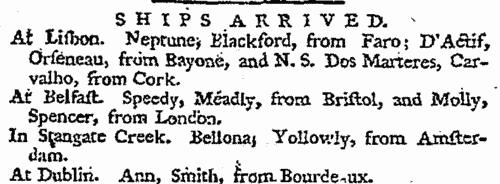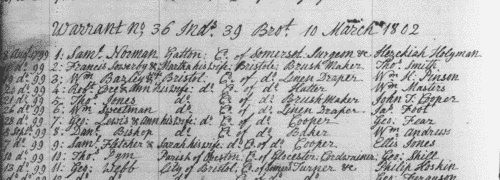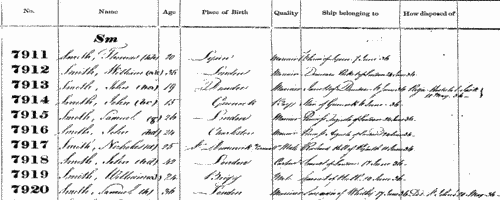Mcvey Surname Ancestry ResultsOur indexes 1000-1999 include entries for the spelling 'mcvey'. In the period you have requested, we have the following 47 records (displaying 1 to 10): Single Surname Subscription | | | Buying all 47 results of this search individually would cost £276.00. But you can have free access to all 47 records for a year, to view, to save and print, for £100. Save £176.00. More... |
These sample scans are from the original record. You will get scans of the full pages or articles where the surname you searched for has been found. Your web browser may prevent the sample windows from opening; in this case please change your browser settings to allow pop-up windows from this site.  Masters of Apprentices registered in Scotland
(1728-1731) Masters of Apprentices registered in Scotland
(1728-1731)
Apprenticeship indentures and clerks' articles were subject to a 6d or 12d per pound stamp duty: the registers of the payments usually give the master's trade, address, and occupation, and the apprentice's father's name and address, as well as details of the date and length of the apprenticeship. There are central registers for collections of the stamp duty in London, as well as returns from collectors in the provinces and in Scotland. The sums collected are recorded in Scottish money, with conversion to sterling for transfer to London. A Scottish pund was worth 20 English pence. (The sample entry shown on this scan is taken from a Norfolk return)MCVEY. Cost: £8.00.  | Sample scan, click to enlarge

|  Apprentices registered in Scotland
(1750-1754) Apprentices registered in Scotland
(1750-1754)
Apprenticeship indentures and clerks' articles were subject to a 6d or 12d per pound stamp duty: the registers of the payments usually give the master's trade, address, and occupation, and the apprentice's father's name and address, as well as details of the date and length of the apprenticeship. There are central registers for collections of the stamp duty in London, as well as returns from collectors in the provinces and from Scotland. (The sample entry shown on this scan is taken from a Norfolk return)MCVEY. Cost: £8.00.  | Sample scan, click to enlarge

|  Masters of Apprentices registered in Scotland
(1750-1754) Masters of Apprentices registered in Scotland
(1750-1754)
Apprenticeship indentures and clerks' articles were subject to a 6d or 12d per pound stamp duty: the registers of the payments usually give the master's trade, address, and occupation, and the apprentice's father's name and address, as well as details of the date and length of the apprenticeship. There are central registers for collections of the stamp duty in London, as well as returns from collectors in the provinces and in Scotland. (The sample entry shown on this scan is taken from a Norfolk return)MCVEY. Cost: £8.00.  | Sample scan, click to enlarge

|  Masters of apprentices registered in Scotland
(1756) Masters of apprentices registered in Scotland
(1756)
Apprenticeship indentures and clerks' articles were subject to a 6d or 12d per pound stamp duty: the registers of the payments usually give the master's trade, address, and occupation, and the apprentice's name, as well as details of the date and length of the apprenticeship. There are central registers for collections of the stamp duty in London, as well as returns from collectors in the provinces. These collectors generally received duty just from their own county, but sometimes from further afield. The indentures themselves can date from a year or two earlier than this return. (The sample entry shown on this scan is taken from a Liverpool return. Each entry has two scans, the other being the facing page with the details of the indenture, length of service, and payment of duty.) IR 1/52MCVEY. Cost: £8.00.  | Sample scan, click to enlarge

| Masters of Merchantmen
(1785)
The Daily Universal Register of April 1785 includes a section entitled Ship News. This is compiled from reports from Portsmouth, Deal, Plymouth, Whitby, Cowes, Falmouth, Bristol and Gravesend as to merchant shipping movements; news of losses and sightings coming in from various ports; a list of Ships Arrived in the (London) River, in the Clyde, in the Creek(e), in the Downs, off the Lizard, off Scilly, off the Start, in Studland Bay, off Whitby, off the Wight, at Aberdeen, Alicante, Ancona, Antigua, Baltimore, Barbadoes, Barcelona, Bayonne, Belfast, Bombay, Bonny, Bordeaux, Brighthelmstone (Brighton), Bristol, Cadiz, Carlingford, Cartagena, Charlestown, Cork, Cowes, Cuxhaven, Dartmouth, Dominica, Dover, Dublin, Dunkirk, Falmouth, Galway, Gibraltar, Grenada, Guernsey, Halifax (Nova Scotia), Hamburg, Havre de Grace, Hull, Jersey, Kinsale, Lancaster, Leghorn, Limerick, Lisbon, Liverpool, Londonderry, Lochryan, Malaga, Marseilles, Montserrat, Nantes, New Providence (Bahamas), New York, Newry, Oporto, Ostend, Penzance, Plymouth, Poole, Portsmouth, Rotterdam, St Eustatia, St John's, St Kitts, St Vincents, Scarborough, Scilly, Seville, Southampton, Stangate Creek, Tenerife, Texel, Tobago, Venice, Waterford, Weymouth, Whitehaven, and in 'Africa', Georgia, Jamaica, Maryland, North Carolina, Philadelphia, South Carolina and Virginia; and Coast Lists made at the Custom House in London. Except in the home ports, the register refers only to British shipping: each ship is usually identified merely by its name, and the master's surname, although masters' christian names are given occasionally. Naval vessels are mentioned rarely, and their captains' names not usually stated. MCVEY. Cost: £6.00.  | Sample scan, click to enlarge

|  Apprentices registered in Scotland
(1802) Apprentices registered in Scotland
(1802)
Apprenticeship indentures and clerks' articles were subject to a 6d or 12d per pound stamp duty: the registers of the payments usually give the master's trade, address, and occupation, and the apprentice's name, as well as details of the date and length of the apprenticeship. There are central registers for collections of the stamp duty in London, as well as returns from collectors in the provinces. These collectors generally received duty just from their own county, but sometimes from further afield. The indentures themselves can date from a year or two earlier than this return. (The sample entry shown on this scan is taken from a Bristol return. Each entry has two scans, the other being the facing page with the details of the indenture, length of service, and payment of duty.) IR 1/70MCVEY. Cost: £8.00.  | Sample scan, click to enlarge

|  British merchant seamen
(1835-1836) British merchant seamen
(1835-1836)
At this period, the foreign trade of ships plying to and from the British isles involved about 150,000 men on 15,000 ships; and the coasting trade about a quarter as many more. A large proportion of the seamen on these ships were British subjects, and so liable to be pressed for service in the Royal Navy; but there was no general register by which to identify them, so in 1835 parliament passed a Merchant Seamen's Registration Bill. Under this act this large register of British seamen was compiled, based on ships' crew lists gathered in British and Irish ports, and passed up to the registry in London. Each seaman was assigned a number, and the names were arranged in the register by first two letters of the surname (our sample scan shows one of the pages for 'Sm'); in addition, an attempt was made to separate out namesakes by giving the first instance of a name (a), the second (b), and so on. But no effective method was devised to prevent the same man being registered twice as he appeared in a second crew list; moreover, the original crew lists were clearly difficult for the registry clerks to copy, and some of the surname spellings appear to be corrupted. A parliamentary committee decided that the system devised did not answer the original problem, and this register was abandoned after less than two years: but it is an apparently comprehensive source for British merchant seamen in 1835 to 1836. The register records the number assigned to each man; his name; age; birthplace; quality (master, captain, mate, 2nd mate, mariner, seaman, fisherman, cook, carpenter, boy &c.); and the name and home port of his ship, with the date of the crew list (usually at the end of a voyage). Most of the men recorded were born in the British Isles, but not all (for instance, Charleston and Stockholm appear in the sample scan). The final column 'How disposed of' is rarely used, and indicates those instances where a man died, was discharged, or deserted his ship during the voyage.MCVEY. Cost: £8.00.  | Sample scan, click to enlarge

|  British infantry fighting in China
(1856-1858) British infantry fighting in China
(1856-1858)
The China Medal was awarded to soldiers and sailors who took part in the prosecution of the war against the Chinese from 1856 to 1860. Separate clasps were awarded for men who had been in receipt of the China Medal of 1842; for being actually present at Canton on 28 and 29 December 1857, when that city was bombarded and finally captured; for being actually engaged in the operations which ceased with the first capture of the Taku Forts, 20 May 1858, and led to the Treaty of Tientsin; for being actually present at the capture of the Taku Forts 21 August 1860; and for being actually present before Pekin the day the gate of that city was given up to the allied (British and French) army, viz. on 13 October 1860. The 59th (The 2nd Nottinghamshire) Regiment of Foot, based at Athlone, embarked from Ireland to Hong Kong 12 June 1849, and remained in China until 1858, not returning to Britain until 1865. The regiment took part in the capture of Canton.MCVEY. Cost: £8.00.  | Sample scan, click to enlarge

| Trainee Schoolmistresses at Edinburgh (Free Church)
(1859)
The Education Department set examinations of trainee teachers at the various training colleges in Britain. This is the class list of the women who took examinations at the Teacher Training College at Christmas 1859. The names are given for the second year first, arranged by division in the examination (in order of merit for the first and second divisions), and then for the students of the first year, arranged similarly. Full names are given (with initials for middle names). The letter (D.) indicates that the candidate had obtained a certificate of competency as a teacher of drawing. An asterisk signifies that the candidate had received a prize for proficiency in drawing. The sample scan is from an Edinburgh list of trainee schoolmistresses.MCVEY. Cost: £6.00.  | Sample scan, click to enlarge

|  Royal Engineers fighting in China
(1856-1860) Royal Engineers fighting in China
(1856-1860)
The China Medal was awarded to soldiers and sailors who took part in the prosecution of the war against the Chinese from 1856 to 1860. Separate clasps were awarded for men who had been in receipt of the China Medal of 1842; for being actually present at Canton on 28 and 29 December 1857, when that city was bombarded and finally captured; for being actually engaged in the operations which ceased with the first capture of the Taku Forts, 20 May 1858, and led to the Treaty of Tientsin; for being actually present at the capture of the Taku Forts 21 August 1860; and for being actually present before Pekin the day the gate of that city was given up to the allied (British and French) army, viz. on 13 October 1860. Several companies of Royal Engineers took part in these actions.MCVEY. Cost: £8.00.  | Sample scan, click to enlarge

|
Research your ancestry, family history, genealogy and one-name study by direct access to original records and archives indexed by surname.
|













